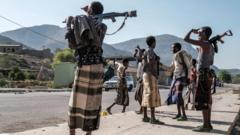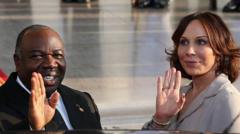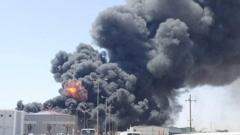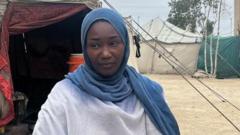The ongoing political strife in South Sudan, characterized by the detention of Vice President Riek Machar, could trigger a resurgence of violence and humanitarian crises in the region.
**South Sudan Faces Turmoil as Vice President Detained in Growing Political Tensions**

**South Sudan Faces Turmoil as Vice President Detained in Growing Political Tensions**
Detention of Vice President Riek Machar amidst potential civil unrest raises alarm for South Sudan's stability.
South Sudan is at a precarious crossroads as Vice President Riek Machar has been held under house arrest in the capital, Juba, since March. The area surrounding his residence is heavily secured, with armed personnel stationed at the entrance and ground patrols ensuring tight control over access. During his confinement, Machar has been stripped of communication devices, while his wife, a government minister, is permitted only limited interactions with him at the compound.
Emerging from its complex independence in 2011, South Sudan has faced multiple crises, marking its existence with civil conflict that drew Salva Kiir, the current president, against Machar in a battle influenced largely by ethnic divisions. Although a peace agreement resulted in a unity government in 2020, the situation has now escalated, as accusations of Machar instigating an uprising through a militia group called the White Army have surfaced. This militia has been linked to violent incidents, including the downing of a United Nations helicopter recently.
With no clear succession strategy in place, the risk of escalating violence and potential civil strife looms larger, leading to worries of a refugee crisis spilling into neighboring nations such as Ethiopia and Sudan, where similar crises prevail. The situation has already seen the involvement of Uganda, which sent troops in March to support Kiir's administration.
The acting press secretary for Machar, Puok Both Baluang, has condemned the detention, claiming it violates constitutional rights and the principles associated with Machar’s esteemed position. This ongoing political saga prompts grave concerns regarding the future of governance and peace in the world's newest nation.
Emerging from its complex independence in 2011, South Sudan has faced multiple crises, marking its existence with civil conflict that drew Salva Kiir, the current president, against Machar in a battle influenced largely by ethnic divisions. Although a peace agreement resulted in a unity government in 2020, the situation has now escalated, as accusations of Machar instigating an uprising through a militia group called the White Army have surfaced. This militia has been linked to violent incidents, including the downing of a United Nations helicopter recently.
With no clear succession strategy in place, the risk of escalating violence and potential civil strife looms larger, leading to worries of a refugee crisis spilling into neighboring nations such as Ethiopia and Sudan, where similar crises prevail. The situation has already seen the involvement of Uganda, which sent troops in March to support Kiir's administration.
The acting press secretary for Machar, Puok Both Baluang, has condemned the detention, claiming it violates constitutional rights and the principles associated with Machar’s esteemed position. This ongoing political saga prompts grave concerns regarding the future of governance and peace in the world's newest nation.





















